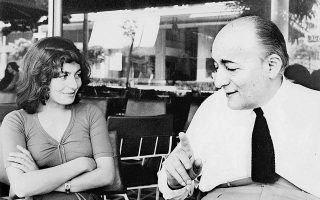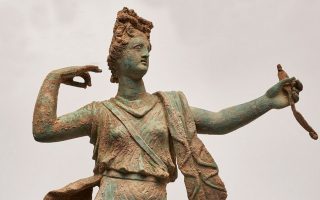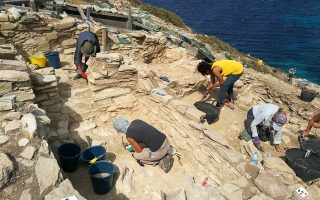Cambridge academic stresses importance of classical education

As she walked in looking poised and cool despite the summer heat, British Hellenist Dr Jennifer Wallace, who is senior lecturer and director of studies in English at Peterhouse, Cambridge, seemed right at home in the classic family restaurant in the upscale Athens district of Kolonaki.
“It is true that in our line of work, the pressure to produce is constant. But I believe that to write a book you need five years of isolation at the library and in your study. I also believe that solitude is a source of inspiration,” she said, smiling.
Wallace first came to Athens in the early 1970s, “when there was no such thing as a traffic problem,” and ever since, her career has been intrinsically linked to Greek culture and history. She is also on the jury panel of the annual London Hellenic Prize, which is what brought her back to the Greek capital earlier this summer. At our meeting at Filippou’s restaurant, she was accompanied by Michael Moschos, who was instrumental in the establishment of the prize that was created in 1996 by John D. Criticos to reward books in the English language on subjects relating to or inspired by Greece or Hellenic culture.
“English-language literature is constantly being enriched in recent years with novels on themes drawn from Greek tradition, mainly from mythology and landmark historical events,” said Wallace.
On the subject of great historical events, the Cambridge professor, who hails from Scotland, where 62 percent of voters rejected Brexit, said that she believes a new referendum needs to be held before Britain leaves the European Union.
What is the cultural framework that gives rise to literature and writers such as Aeschylus, Sophocles, Euripides and Shakespeare?
The expression of tragedy tends to flourish during periods of great transition – the 5th century BC was one such period, the end of an era that marked the transition from heroic societies to a democracy; the same was the case with Shakespeare, with the fall of Catholicism and the rise of Protestantism – times when society looks for new means of expression. Something similar took place in the United States after World War II with the creation of a new social order that wanted change but was also concerned about preserving its values.
Do you believe that Greeks know their history? Many still talk about bygone glories, but this is a connection that I believe is rather tenuous at best with the present.
Managing the past is a process that most nations find incredibly difficult. It requires education and knowledge of history. I will remind you of Lord Byron’s story. When he came to Greece in 1812 and saw the monuments of the ancient Greeks, he realized that people knew nothing of their importance, of their history. Almost two centuries later, when I finished my PhD on Shelley and Romantic Hellenism in 1992, I spent several months trekking on Mount Taygetus, in the Vikos Gorge on Mount Pindus, and on Samothraki. I wanted to follow in Byron’s footsteps on the Epirus part of my journey. When I reached the village of Vitsa in Ioannina, I saw a street named Byron and asked the locals if they knew why. No one could tell me. The monastery where Byron had stayed was closed, dead. It was as though there was no memory of Byron’s presence in the village of Vitsa, as though it had never happened. When we refuse to connect to our historic past, that takes revenge by simply ceasing to exist.
In the meantime, though, the humanities are increasingly underfunded. Why is that, in your opinion? And what is it that keeps our relationship with classical studies alive?
Classical studies have not been mandatory in schools [in the UK] since the late 1980s. Latin and ancient history are still taught at many public and grammar [private] schools, as is Ancient Greek. The nongovernmental organization Classics for All has been providing funding from private sources to public schools for classical studies since 2011, and with remarkable success too. The state in England – but also many students – looks at it from a utilitarian perspective: Since Ancient Greek and Latin are dead languages that are not used in day-to-day life and are not particularly useful in helping people find work, they are also useless languages.
But all great cultures and the arts and the literature they produce, like their great and enduring influence on the history of Europe, cannot be fully understood without sufficient linguistic knowledge. Exhibitions of ancient art, modern performances of ancient tragedies and many literary works inspired by myths and historical facts are what keep our relationship to classical antiquity alive.
What is the relationship between ancient Greek drama and the modern way of life? How relevant is it today?
In tragedy, the heroes lament their fate, their ideals, their people. The means of expression may have changed, but there is certainly a lot to lament in the modern world. One such instance was the 9/11 attack on the Twin Towers in New York. Another is the acute refugee crisis, while climate change is a third. These are events whose causes can also be interpreted from a cultural perspective.
What about Brexit? Is that another modern-day tragedy?
There was a movement for Britain to leave the European Union in the 1990s. This was a kind of precursor to Brexit, which I see as a desire to live all alone on Britain, cut off and surrounded by the sea. It is a stupid, self-destructive decision that points to a nation having become a small state. Brexit is basically a breakdown of national self-esteem. The British nation has stopped believing in itself.
Do you think that the issue should be put to a referendum again?
Absolutely. I absolutely believe that a new referendum needs to be held, because the consequences of Brexit have not been clearly understood. This was mainly due to populist tactics from a section of the politicians who were in favor of leaving the European Union. Its past as an empire has left a deep imprint on the mind of the British people, and, together with colonial guilt, this has resulted in the British people no longer knowing their geopolitical identity.
If Brexit does happen, deal or no deal, will this fuel independence movements in other parts of Britain?
Possibly, yes. The Scots, for example, are already asking for another independence referendum. More generally, everyone is wondering what is keeping all the different areas together. The issue of Ireland’s division is yet another chaotic dimension: How can independent Ireland belong to the EU and not Northern Ireland? Separatist forces are on the rise. The harm has already been done, though. Let’s not kid ourselves; a rift has been driven into Britain that will take many years to heal.
This interview was translated from the Greek text.





